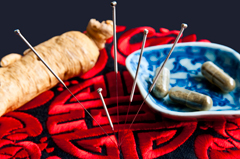
Monterey Institute of Natural Medicine
885 Centre Park Drive
Suite #2F
Columbia, MD

More Acupuncture Articles
What Is Qi? Part 2

Last month’s article defined Qi and described Qi in nature. This month’s article will describe the different types of Qi and their function in the human body.
Where Does the Qi Come From and Go? Is There a Destination For Qi?
According to the Yellow Empire Internal Medicine and Taoism, Qi comes from nature and goes back to nature through the cycle of transformation and translation. The Yin-Yang Theory, which is the Law of the Universe, explains that Qi is Yang in a cycle of interacting with Yin infinitely. When Qi is separated from Yin, life ends.
What Types Of Qi Are In Traditional Chinese Medicine Terminology?
According to Traditional Chinese Medicine terminology, the primary types of Qi in healthcare are:
- Prenatal Qi, which is given by parents before birth.
- Postnatal Qi, which is self-built after birth.
- Jing Qi, which is the essence of both prenatal and postnatal Qi that forms the strength of life.
- Yuan Qi is the original Qi that is rooted in the lower abdomen.
- GuQi is given through the process of translation and transformation of food.
- KongQi is air Qi, for breathing.
- ZongQi, also called Gathering Qi, is collected in the chest from KongQi.
- ZhenQi, also called the true Qi, originates from original Qi, and is an indicator of the physical and mental condition.
- YingQi, nutritive Qi, is rooted in the deep organs and runs inside the circulation and lymphatic systems.
- WeiQi, the defense Qi, is an indicator of immunity.
What Do These Qi Primarily Do For the Human Body?
- Protection – protects the body from external pathogens.
- Warming – warms and cools the body, balances the temperature.
- Holding – holds the organs in place; keeps the blood in the vessels; governs fluid.
- Transformation internally – transforms food and air into blood and Qi.
- Transportation – governs the movement of Qi circulating in the meridians, preventing stagnation and promoting growth.
Healthy Qi vs. Disturbed Qi
- Healthy/Good Qi: energetic, good endurance, strong relaxed muscles, balanced immune system, fast healing, hearty digestion, good sleep, clear mind and concentration, positive and balanced mood
- Disturbed/Bad Qi: anxiety/depression, difficulty handling pressure, negative thoughts, uncontrollable anger or mood, physical and verbal violence, attempts at suicide or destroying things, physical/mental pain.
Tips For Healthy/Good Qi
Lead a balanced lifestyle that includes a proper diet, regular work outs, a positive attitude, a group of people who around bring joy and security, and stay away from negative thoughts. Also practice Taiji, yoga, meditation, outdoor activities, and seek therapies such as acupuncture, cupping, moxa, Tuina massage, etc.
Over exertion or lack of exercise, or an unbalanced lifestyle/diet, can deplete or disturb Qi, which can cause complication or physical or psychological injury.

















